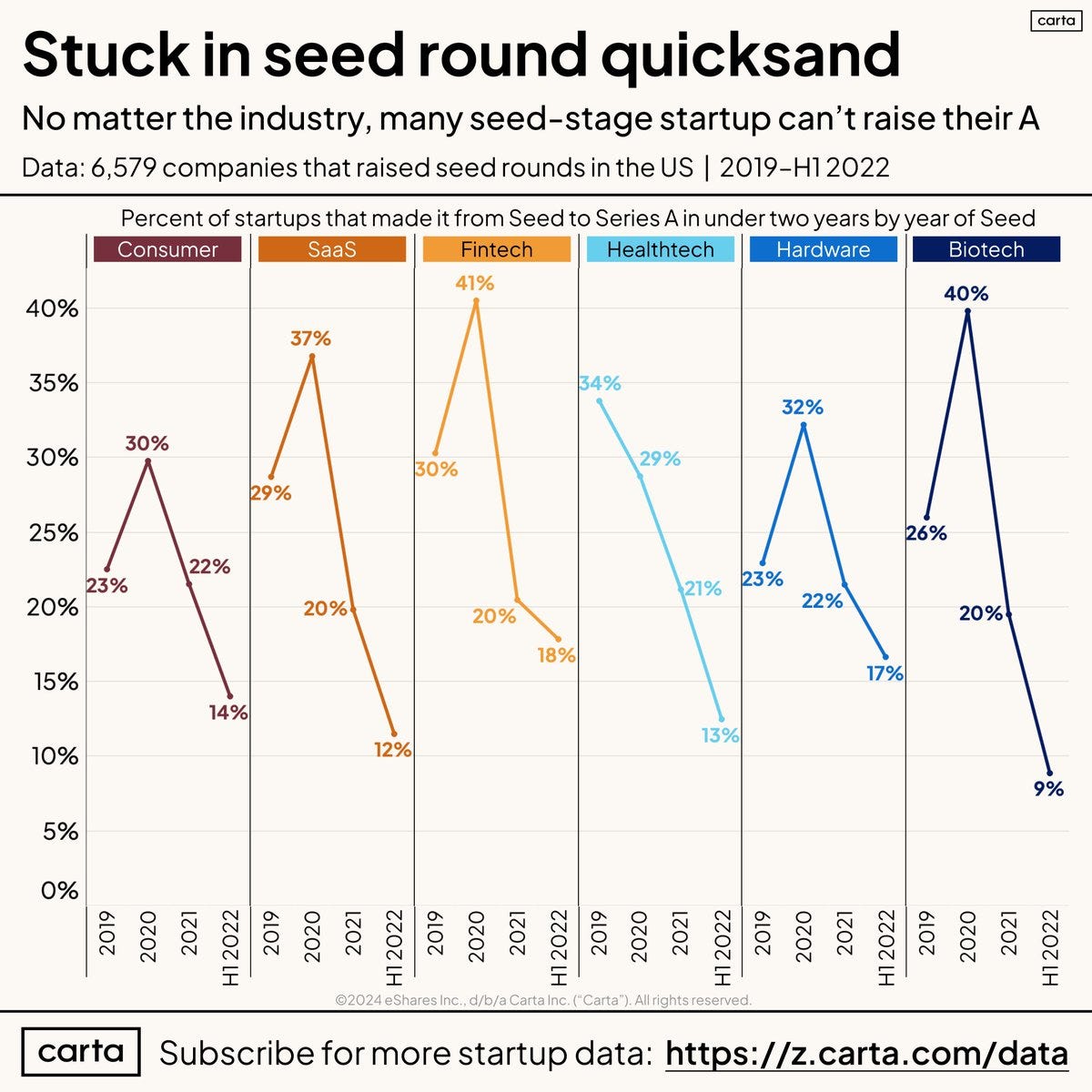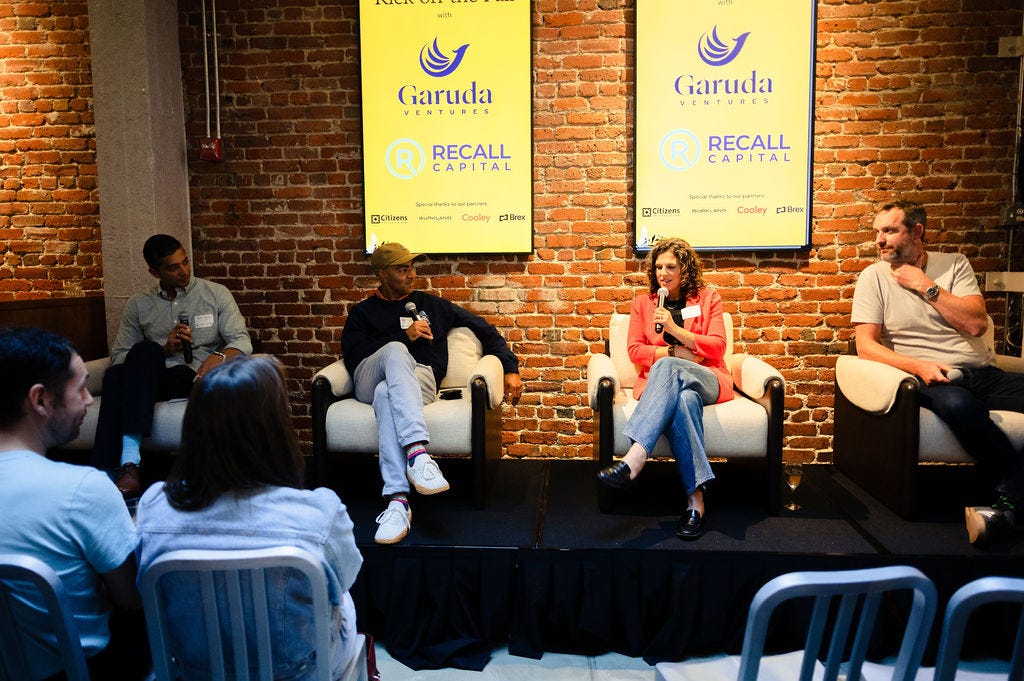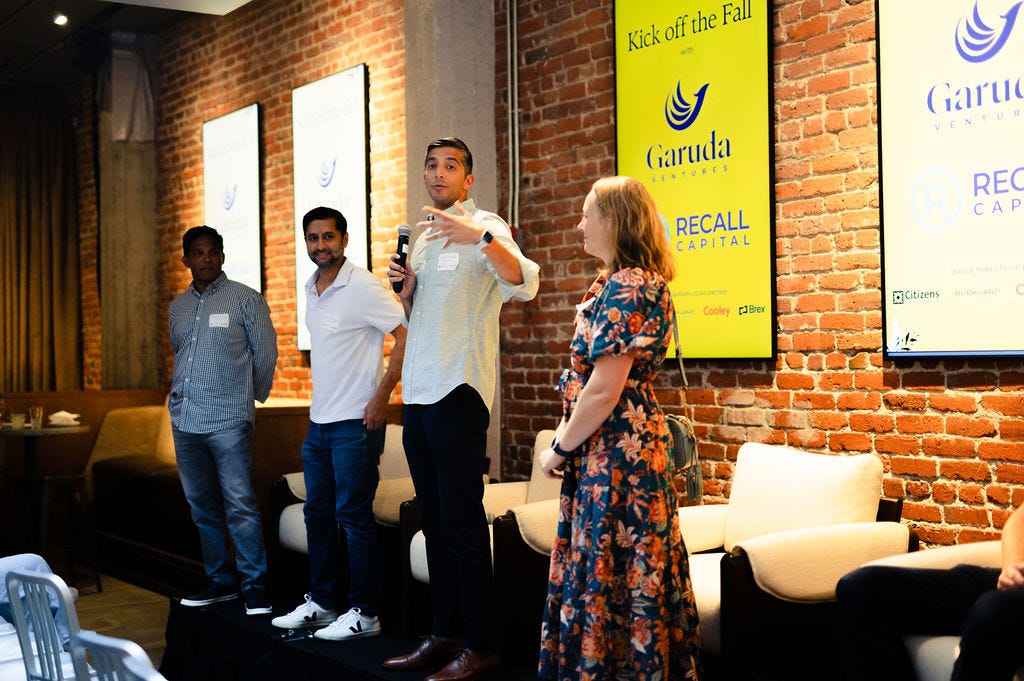What it takes to raise your Series A
Thoughts from our panel with Accel, a16z, and Scale Venture Partners
No matter who you are or what sector your building in, raising a Series A is not as easy as it used to be. Data from Carta shows it’s now taking well over two years to go from Seed to A, and many more companies won’t cross the “Series A chasm” than in years past.
Just like with best movie ever, ask five people on how to best position yourself to raise the A and you’ll get five different answers. So, together with our friends Sarah and Somrat at Recall Capital, Arpan and I hosted an event to gather more perspectives for ourselves.
I had the pleasure of moderating a panel discussion with some close friends and active Series A investors, Anish Acharya at a16z, Sara Ittelson at Accel, and Alex Niehenke at Scale Venture Partners, to get their thoughts on the market today and what they look for when investing.
There is optimism in the market
While the current fundraising environment might not be as frothy as a few years ago, there’s still plenty of room for optimism. As Anish pointed out, “Good deals are still getting funded, and now everyone just seems psyched about what products are being built.” The big difference compared to the ZIRP-era is opportunity cost. The reality is a Series A investor typically only invests in 1-2 companies a year. This means they will pass on a lot of companies that are interesting and exciting while waiting to find the one company that they are excited about dedicating the next decade+ to. So, despite the market not being as bearish as a few years ago, not much capital is getting deployed as fast. As a founder it’s important to make sure you’re developing relationships with investors to identify those that get excited about what you’re building.
Build relationships early
While there may be some debate about the value of building relationships with investors and taking “coffee chats” while not raising, the message from the panel was clear: The power of relationships cannot be overstated. Alex noted that “two-thirds of [Scale’s] deals are probably a relationship that was established at least six or 12 months prior.” Now, that’s not to say you cannot successfully raise from investors without getting to know them before hand (Sara, Alex, and Anish all described getting to conviction over a weekend). But, particularly given how long you’ll be working with a Series A lead investor, building these relationships early allows both sides to gauge compatibility and align on long-term vision. If you can, choose three to five investors you would be thrilled to have lead the round and, assuming mutual interest, get to know them over time. The more time you invest in understanding each other, the smoother the path to partnership will be when it’s time to make it official.
The “texture” of the numbers matter more than the numbers themselves
One question we touched on during the panel was metrics, and when a company is ready for a slam dunk Series A. I expected the answer to be a number to update the old “$1M+ in recurring revenue” threshold. However, it was clear that what matters is not a specific revenue number, but instead the quality or “texture” of the revenue. As Sara put it, “How you articulate some of that texture of your numbers to make people appreciate what they represent about the potential of your business” matters a lot.
As far as more concrete metrics go, Alex mentioned the Series A window opens around $300k or $400k of revenue (“You didn’t just sell to your friends”) while Anish suggested the time to the first million of revenue, forward growth rate, and whether or not that that satisfy the conclusion that the investor is looking to reach. Per Anish, “I think when the investor already has intuition and enthusiasm about something, [as a founder] I want to set the numbers to not disprove that intuition.”
It’s not all AI, but you should be talking about it
Now, there’s certainly undeniable excitement about AI-driven companies. However, all the panelists noted, “You don’t have to be AI to get funded.” That said, it is important to articulate how AI will impact your business, whether it is in how your product satisfy the customer pain points, how harness AI-powered tools to acquire customers, or how you will respond to an ‘AI-native’ competitor. As Alex mentioned, “If [you] aren't thinking about this, aren't engaging with this, [your] technology teams aren't using this technology, I just don't think you're going to survive for the next decade, not because AI is a thing, but because you're getting out performed by other people who are more innovative and hungrier than you are.”
Other Tips to help your Series A process
Build an FAQ: If you working in a complex or complicated industry with a bunch of jargon and acronyms that most people won’t understand, build an “Industry for Dummies” guide and send it to investors before the meeting. This lets them be more prepared and able to dig into the meat during the meeting (and if they don’t read it, helps you quickly qualify them out!) It gives you some good content you can share with incoming employees or even publicly
Don’t waste the ‘market size’ slide: The market size slide is often missed opportunity in the deck. It inevitably shares a single, absurdly large number that is supposed to rationalize an investment into the company (“Look at my $100B TAM!!!”) However, using it to explain the nuances of your market - why your type of product can exist, the spend that you might be able to unlock from there the sequencing from a product execution perspective and how that ties to the product roadmap, and more - allows you to demonstrate your nuanced understanding of the market which will only help as you raise
Raising a Series A is no small feat, but the right preparation, relationship-building, and genuine passion for your customers and market should set you up on the path to success. A special thanks to our panelists Anish, Sara, and Alex and our co-hosts of the event Sarah and Somrat. And a special shout out to our great sponsors Citizens, Burkland, Cooley and Brex who helped make the event possible.
Garuda Ventures is a B2B-focused, pre-seed and seed-stage venture firm. Subscribe below to get the latest from us, and visit garuda.vc to learn more.






